Risque
Le rapport « La situation mondiale des transferts monétaires » du CaLP Network indique que l’idée selon laquelle les transferts monétaires seraient plus risqués que d’autres formes d’aide est l’une des barrières principales à l’utilisation fréquente de cette modalité. Ces craintes sont liées à l’insistance de plus en plus franche des bailleurs concernant la lutte contre le terrorisme et contre le blanchiment d’argent, et à l’amenuisement des budgets destinés à l’assistance humanitaire. Le travail du CALP Network sur cette problématique vise à combattre les idées reçues, à faciliter la collaboration et à partager les apprentissages afin de veiller à ce que les transferts monétaires soient systématiquement considérés, tout comme d’autres modalités, en fonction des données probantes disponibles sur les risques réels de toutes les modalités.
Priorités actuelles
Plusieurs organisations travaillent actuellement sur les risques entraînés par les transferts monétaires. Le CALP Network cherche à identifier les synergies entre acteurs, à éviter les duplications et à définir des priorités communes sur lesquelles nous pourrions agir plus efficacement en groupe. Avec le PAM, le CALP Network co-dirige l’élément Risques, priorité du chantier du Grand Bargain sur les transferts monétaires.
Contenu présenté
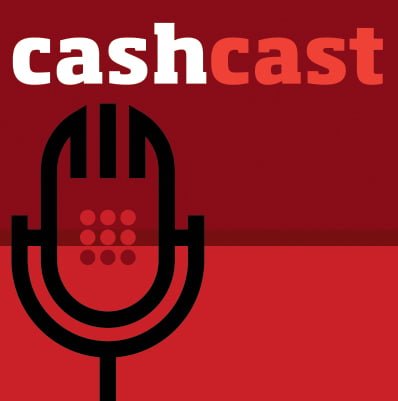
Podcast: Will risk aversion hold us back from realizing the potential of CVA?
Podcast
Episode 1 of the CashCast, exploring how attitudes to risk have impacted the use of CVA in the Middle East and North Africa region.

Transferts monétaires et risques : ce qui se passe sur le terrain, reste sur le terrain (et pourquoi c’est un problème)
Blog Post
En octobre 2019, le CALP Network a facilité à Douala, au Cameroun, une réunion de partage d’expériences sur les risques liés à la protection des bénéficiaires dans les interventions monétaires. Cette réunion restreinte, organisée dans le cadre d’une série de rencontres dans différentes régions, a permis à 25 travailleurs humanitaires d’Afrique de l’Ouest et du Centre,...

Webinar: Data sharing in CVA: ethics, ownership and privacy
Event
Thematic lead
Contenu récent

External Evaluation of SDC/HA Emergency Cash Pilot For Earthquake Affected Households in Bubq, Albania
Report
In November 2019, Albania was hit by a large earthquake with a magnitude of 6.4, causing 51 people to lose their lives and injuring 913 people. Around 47,000 additional people were directly affected by the earthquake. The Swiss Agency for Development and Cooperation (SDC) immediately deployed a rapid...
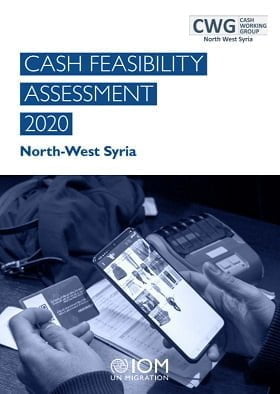
Cash Feasibility Assessment for NorthWest Syria
Report
The objective of this cash feasibility assessment for northwest Syria is to provide evidence-based, structured analysis of the various dimensions that make cash and vouchers interventions feasible. The primary audience for this document are all the organizations either currently involved in cash-based...
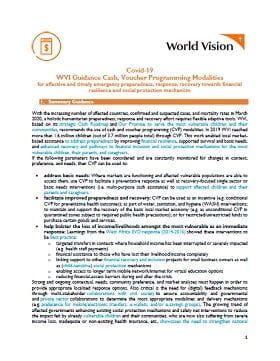
Covid-19 WVI Cash, Voucher Programming Modalities
Guidelines and Tools
With the increasing number of affected countries, confirmed and suspected cases, and mortality rates in March 2020, a holistic humanitarian preparedness, response and recovery effort requires flexible adaptive tools. WVI, based on its strategic Cash Roadmap and Our Promise to serve the most vulnerable...
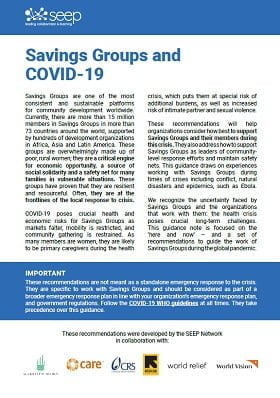
Savings Groups and COVID-19
Guidelines and Tools
COVID-19 poses crucial health and economic risks for Savings Groups as
markets falter, mobility is restricted, and community gathering is restrained. As many members are women, they are likely
to be primary caregivers during the health crisis, which puts them at special risk of additional burdens, as well...
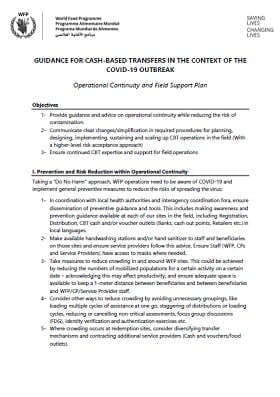
WFP – Guidance for Cash-based Transfers in the Context of the Covid-19 Outbreak
Guidelines and Tools
The objectives of this document are:
1- Provide guidance and advice on operational continuity while reducing the risk of contamination.
2- Communicate clear changes/simplification in required procedures for planning, designing, implementing, sustaining and scaling up CBT operations in the field (With a...

Cash Week 2019: How cash is driving change across the system
Blog Post
Cash Week 2019 aimed to provide a space to reflect, learn, and look ahead, to ensure quality in our use of CVA at scale. The CALP team reflects on the key takeaways from the events that took place around the world, and what they mean for actors within and beyond the humanitarian sector.

Mitigating Risks of Abuse of Power in Cash Assistance in Uganda
Report
This document outlines lessons learned from a joint UNHCR/WFP project in Uganda with the aim to identify and mitigate the risks of abuse of power in cash assistance through the main delivery mechanisms used in-country: mobile money, e-cards and cash delivered through mobile vans.

A guide to Cash and Voucher Assistance at Humanitarian Networks and Partnership Week
Blog Post
Don’t miss any of the sessions on cash and voucher assistance during the Humanitarian Networks and Partnership Week, which takes place in Geneva from 3 to 7 February 2020. On Monday 3 February, dive into the week with a session from the CALP Network on the Future of Financial Assistance: Supporting...

Données probantes relatives aux transferts monétaires et aux marchés EAH dans les situations d’urgence : résumé des conclusions
Rapport
Ce rapport vise spécifiquement à : • présenter les pratiques actuelles (et les lacunes dans les pratiques) de l’utilisation des TMUM pour les résultats WASH dans les situations d’urgence, en identifiant les contextes et les conditions dans lesquels les TMUM sont utilisés et en soulignant les...
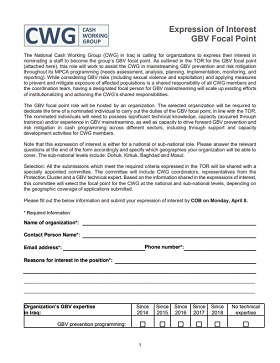
Expression of Interest GBV Focal Point
Policy paper
The National Cash Working Group (CWG) in Iraq is calling for organizations to express their interest in nominating a staff to become the group’s GBV focal point. As outlined in the TOR for the GBV focal point (attached here), this role will work to assist the CWG in mainstreaming GBV prevention and risk...

Podcast: Will risk aversion hold us back from realizing the potential of CVA?
Podcast
Episode 1 of the CashCast, exploring how attitudes to risk have impacted the use of CVA in the Middle East and North Africa region.

Cash Week 2019: Collaborating for quality, today and tomorrow
Event
Cash Week 2019 provided a space to reflect, learn, and look ahead, to ensure quality in our use of cash and voucher assistance (CVA) at scale. An expanded agenda saw events taking place globally throughout November and December.

Cash and Voucher Assistance and Risk in Financial Management and Compliance
Report
The CALP Network commissioned a scoping study on CVA and risk in financial management and compliance, which considered three specific challenges facing humanitarian organisations related to AML/ CTF regulations:
1. Transferring funds to the country of operations – challenges in identifying competent and...

Atelier d’apprentissage sur les risques liés aux TM: recommendations de Douala
Rapport

Risks learning event recommendations – Dakar
Report

CVA and Risks in West and Central Africa: Putting beneficiary protection and responsible data management at the heart of our work
Event

Transferts monétaires et risques : ce qui se passe sur le terrain, reste sur le terrain (et pourquoi c’est un problème)
Blog Post
En octobre 2019, le CALP Network a facilité à Douala, au Cameroun, une réunion de partage d’expériences sur les risques liés à la protection des bénéficiaires dans les interventions monétaires. Cette réunion restreinte, organisée dans le cadre d’une série de rencontres dans différentes...

The Future of Financial Assistance: Why we wrote it, and where next
Blog Post
The world is changing rapidly. The way we deliver assistance is not. The CALP Network and IARAN’s new report on the Future of Financial Assistance makes clear that (i) significant change is urgently needed – new partners, new tools, new modes of collaboration, (ii) change must be drive by what’s...

Harmonising Data Systems for Cash Transfer Programming: Three key steps for Somalia
Blog Post
Cash and voucher assistance (CVA) is gaining traction as a transformative tool for addressing humanitarian needs in Somalia, with people living in crisis reporting that transfers of this kind helped to build resilience and diversify livelihoods. Delivery, however, is plagued by data challenges around the...
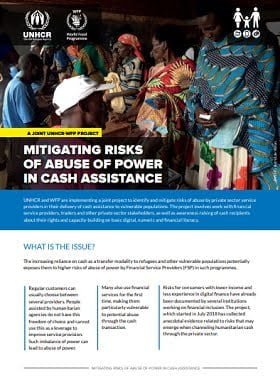
Mitigating Risks of Abuse of Power in Cash Assistance – 4 pages
Report
UNHCR and WFP are implementing a joint project to identify and mitigate risks of abuse by private sector service providers in their delivery of cash assistance to vulnerable populations. The project involves work with financial service providers, traders and other private sector stakeholders, as well as...



